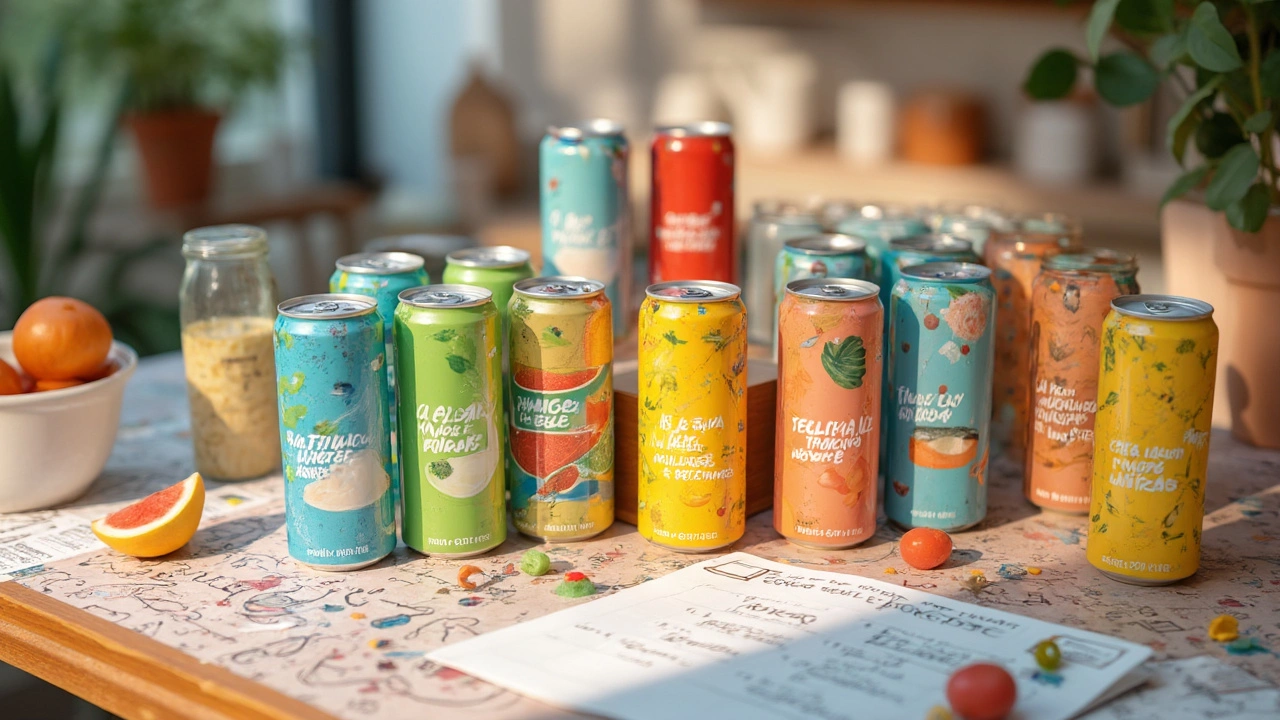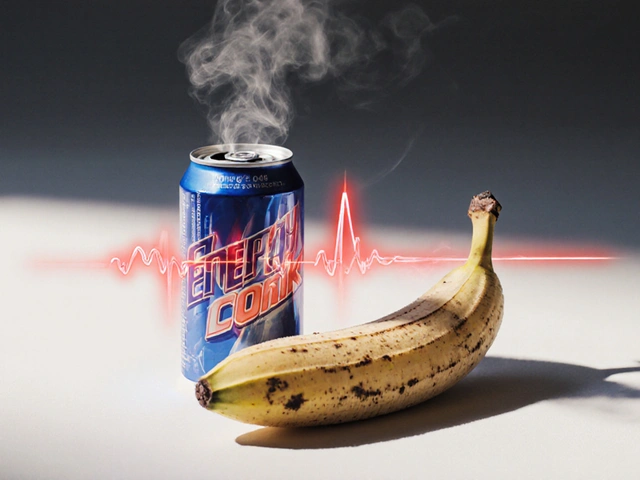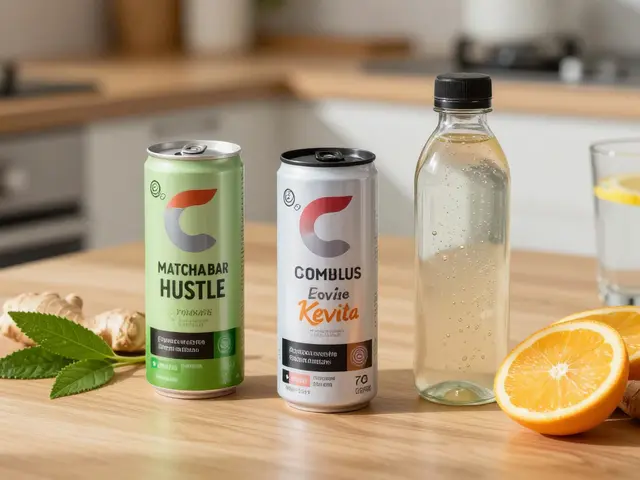Are 0 Calorie Drinks Really 0 Calories?

So, you've probably seen those sleek cans shouting '0 calories!' from supermarket shelves, right? They're super tempting, especially when you're watching your waistline. But here’s a question: are they really zero calories? Let’s get into the nitty-gritty.
The trick behind these drinks lying in their clever use of sweeteners and other ingredients. Instead of sugar, they use sweeteners like aspartame or stevia that pack intense sweetness without the calorie count. But it's not actually magic. The body processes things differently, and you might be surprised what a '0 calorie' label can hide.
Now, before you sip without a care, there are a few things you might want to know. For instance, some experts say that artificial sweeteners may mess with your metabolism or trick your brain. Sounds wild, but it’s worth considering if downing diet sodas is your thing.
- The Science of 'Zero Calories'
- Ingredients That Make It Possible
- The Role of Artificial Sweeteners
- Health Implications and Tips
The Science of 'Zero Calories'
At first glance, 0 calorie drinks seem like they’ve cracked the code to indulging without any guilt. But how do they actually manage this calorie magic trick? The secret lies in understanding how calories are calculated and the role of artificial ingredients.
Calories aren't just removed; they're simply not there to begin with. These drinks use non-caloric sweeteners, which provide sweetness without the extra energy that sugar brings. This means you enjoy the taste without adding to your daily calorie count.
When you look at the nutrition label on these beverages, you'll often see sweeteners like aspartame, stevia, or sucralose. These substances are hundreds of times sweeter than regular sugar, so less is needed to achieve the same sweetness. Your taste buds are tricked into feeling like you’re having a sugary drink, without your body absorbing the calories.
Still, there are traces of calories in some of them because regulatory rules allow them to be labeled as 'zero' if the calorie count is under a certain threshold, like 5 calories per serving. So, technically, they could have a teeny bit. Not enough to derail a diet, but something to note if you’re drinking large amounts.
Here’s a little perspective for you:
| Sweetener | Sweetness Compared to Sugar |
|---|---|
| Aspartame | 200x |
| Stevia | 300x |
| Sucralose | 600x |
Now, while it's true these drinks technically qualify as low or zero-calorie, it's essential to understand the 'zero' strategy. Think of it like clothing sizes; just because it says 'one-size-fits-all' doesn’t mean it fits everyone the same way!
When choosing low-calorie energy drinks, knowing how this 'zero-calorie' label is achieved can help you decide whether to include them in your diet. And hey, knowledge is power, right? So next time you're sipping that diet cola or energy drink, you'll know exactly what’s going on with those sneaky labels.
Ingredients That Make It Possible
Ever wonder how 0 calorie drinks manage to taste so sweet without any calories? The secret sauce comes down to the ingredients they use. These drinks swap out sugar for artificial sweeteners like aspartame, sucralose, and stevia. Each sweetener packs a punch of sweetness without the calorie bomb, letting you indulge minus the guilt.
These sweeteners are hundreds, sometimes thousands, of times sweeter than regular sugar, so only a tiny bit is needed to sweeten an entire drink. For example, aspartame is about 200 times sweeter, and sucralose is around 600 times sweeter than sugar. That tiny amount means minimal calories—practically zip—making them very handy for low-calorie energy drinks.
Some 0 calorie drinks also use carbonated water, caffeine for a bit of a boost, and natural flavors to make them more refreshing. A dash of preservatives like potassium benzoate ensures that your drink stays fresh longer on the shelf. While these ingredients help keep the calorie count low, they can have different effects on how each person feels after drinking them.
Want a quick snapshot of these ingredients? Here's a breakdown:
- Aspartame: About 200 times sweeter than sugar, often used in diet sodas.
- Sucralose: Around 600 times sweeter, found in many diet or light drinks.
- Stevia: A natural, zero-cal option that is roughly 200-300 times sweeter than sugar.
- Carbonated Water: Adds the fizz without calories.
- Caffeine: Popular in energy drinks, it gives that energy kick.
Knowing these ingredients is key to understanding how companies pull off the 'zero calorie' label. It’s a well-calibrated science that helps balance taste with calorie consciousness.

The Role of Artificial Sweeteners
Alright, let’s talk about what’s really going on with these sweet little imposters known as artificial sweeteners. They’re the key players in making 0 calorie drinks taste good without sugar. But how do they manage that trick?
These sweeteners, like aspartame, sucralose, and stevia, are up to hundreds of times sweeter than regular sugar. That means you need just a teeny amount to get the same level of sweetness, which translates to almost zero calories. Yet, our taste buds are fooled into thinking we’re getting something sugary.
But here's a twist: these sweeteners can sometimes confuse our bodies. Some studies suggest they might interact with hormone levels and mess with how we feel hunger or fullness. A bit of a mixed bag, right? Your brain might be expecting calories and sugar rush, but when it’s not getting any, it can make you crave more food later.
If you're guzzling down a lot of low-calorie energy drinks, it might be worth knowing that not everyone reacts the same. Some people feel fine, while others might notice changes in appetite or digestion.
Curious how these sweeteners stack up? Here’s a quick snapshot of each:
- Aspartame: Often used in diet sodas, it's around 200 times sweeter than sugar, but doesn’t affect blood sugar like sugar does.
- Sucralose: Super popular since it’s about 600 times sweeter than sugar. Found in many 'sugar-free' labelled items.
- Stevia: Coming from a plant, it's natural but still approximately 200-300 times sweeter than sugar.
So, are artificial sweeteners safe? For the most part, experts say they’re okay in moderation. But like all things, it pays to check how they fit with your body and health goals. Plus, keeping an eye on the overall diet might help in striking the right balance, so those '0 calories' add up to something good in the long run!
Health Implications and Tips
Alright, so you're sipping on those shiny cans of 0 calorie drinks, thinking you’re dodging the whole calorie game. But are there health implications you should be aware of? First, let’s chat about how artificial sweeteners, like aspartame or sucralose, in these drinks could impact your well-being.
Some studies suggest that artificial sweeteners might mess with our gut bacteria. This sounds like sci-fi, right? Your gut is like a well-oiled machine, and these sweeteners could throw a wrench in the works. Authors of a 2023 study noted that changes in gut bacteria might affect metabolism and glucose levels. Something to keep in mind if you're downing a few cans daily.
Now, there's this buzz about sweeteners tricking your brain into craving more sugary stuff. Even if the drink is 'sweet without sugar,' your brain might think, 'Hey, where's my sugar fix?' leading to potential cravings for actual sugary snacks!
But don’t stress. Here are some tips to navigate low-calorie energy drinks wisely:
- Balance is key! Mix in regular water or herbal teas to stay hydrated without additives.
- Read labels: Check for sweeteners you might want to avoid and see if anything funky is added.
- Mind the caffeine: Some of these drinks pack a punch. Keep an eye on your caffeine intake, especially if you're sensitive.
If you're looking at numbers, here’s something neat:
| Sweetener | Calories per 2g portion |
|---|---|
| Aspartame | 8 |
| Stevia | 0 |
| Sucralose | 0 |
So, as you reach for that 0 calorie drink, just remember to think beyond the label. A little mindfulness goes a long way in making smarter choices. Happy sipping!






Comments (10)
Liam Hesmondhalgh
18 Jul 2025
Alright, so let's get one thing straight. These "0 calorie" drinks aren't exactly 'zero' in the strictest sense, but the truth is, they're allowed to label as zero calories because the calories per serving are below a certain threshold set by regulators, usually under 5 calories per serving. So technically, they might have like 4.9 calories, but hey, that rounds down to zero. Sounds sneaky, yeah?
Also, artificial sweeteners, while they don't contribute calories in the same way sugar does, can still mess with your metabolism and appetite. Some studies suggest that even if these drinks seem calorie-free, they might indirectly contribute to weight gain or cravings. So if you really want to be health-conscious, relying on these drinks might not be the golden ticket you think it is.
Overall, it's about reading the fine print and understanding what '0 calorie' means legally versus practically. Don't get fooled by marketing hype just yet.
Patrick Tiernan
20 Jul 2025
Ugh, honestly, who even drinks these things seriously? The whole '0 calorie' tag is such marketing fluff! Like, they use chemicals to sweeten it without adding calories but then, what's that doing to our bodies? Probably worse than plain sugar. You can't fool Mother Nature, man.
And really, if you're worried about calories, maybe just drink water. It's that simple. These fizzy 'free' drinks are just a lazy person's excuse to not deal with real nutrition. The amount of artificial junk in them is disgusting when you think about it.
But of course, it's easier to just sip some zero-cal stuff and pretend we're healthy, right? Please, folks, don't fall for the nonsense.
Nikhil Gavhane
21 Jul 2025
Hey everyone, I think we should consider the bigger picture. While some concerns about artificial sweeteners are valid, these 0 calorie drinks can still be useful alternatives for people trying to reduce sugar intake, especially those with diabetes or trying to control their weight.
It's also important to moderate consumption and not treat these drinks as a health elixir. They just provide a way to enjoy sweetness without the calories from sugar. Like any processed item, balance is key.
At the end of the day, staying informed and combining a healthy diet with regular exercise is what matters most. These drinks are just one small piece of the puzzle.
Liam Hesmondhalgh
22 Jul 2025
^ Yeah, I get what you're saying but I can't shake the feeling that slight metabolic effects from these sweeteners add up over time. The article barely touched on that. It's like they try to reassure us but ignore potential long term consequences.
Plus, the way some people overconsume these beverages thinking they're harmless is a problem. Those zero calories can turn out to be a false sense of security.
Would love to see more robust studies instead of just regulatory loopholes defining "zero calories." What do you think about that?
Rajat Patil
23 Jul 2025
I appreciate the concerns, truly. However, we must be mindful not to jump to conclusions without comprehensive evidence. Current scientific consensus indicates moderate use of artificial sweeteners is generally safe.
It’s also imperative to contextualize individual differences - some might respond differently to these ingredients. Personalization in dietary choices is important.
Approaching the subject with openness and patience to new research will help us make better-informed decisions.
deepak srinivasa
26 Jul 2025
This discussion makes me wonder about the exact mechanisms by which these low-calorie sweeteners affect appetite or metabolism. Does anyone have insight into how substances like aspartame or sucralose interact with our gut or brain in terms of calorie perception?
Also, the distinction between 'not caloric' and 'not metabolically active' is confusing. Are the artificial sweeteners truly inert if they trigger appetite or insulin responses?
Would be great to get a deeper explanation or some studies linked here.
anoushka singh
27 Jul 2025
I've always been curious about this too. Some research I've read suggests that sucralose can influence gut bacteria in ways that might indirectly affect metabolism and insulin sensitivity, but the evidence is still emerging and often contradictory.
Plus, it's worth noting the quantity consumed matters a lot. Having a diet soda once in a while isn't the same as downing multiple cans a day.
So, while these drinks technically have 'zero' calories, their overall influence on health isn't black and white. It's a grey area, which this article does a decent job summarizing.
pk Pk
29 Jul 2025
I want to add that we should also consider psychological factors. Sometimes drinking zero calorie drinks may trick our brain into seeking more sweetness afterward or more calories from other sources.
It’s not only about the chemical calories but also how our habits are shaped. Moderation and mindful consumption really help here.
Nothing magical about zero calorie drinks, but when used in the context of a balanced diet, they have their place.
Rubina Jadhav
1 Aug 2025
I appreciate all these perspectives. What stood out to me the most is how complex our relationship with food and drinks is. Simplifying everything to 'zero calorie' can mislead and mask the bigger issues.
Personally, I think opting for natural beverages like water, herbal teas, or fruit-infused water can be a great way to avoid confusion and stay hydrated without additives.
Still, it’s good to be aware and not demonize all zero calorie drinks outright, just understand limitations.
Sandeepan Gupta
12 Aug 2025
One thing I'd suggest everyone keep in mind is that labeling laws are very strict about what can be called 'zero calories'. As some have pointed out, below 5 calories per serving means it’s rounded down. So technically, some drinks do have a tiny amount of calories, but negligible in most contexts.
The health effects of artificial sweeteners are still widely researched, but current evidence supports their safety at moderate levels. That said, overconsumption may cause unwanted effects like bloating or digestive issues for some.
Ultimately, it’s about making informed choices and paying attention to your body's response rather than just trusting labels blindly.